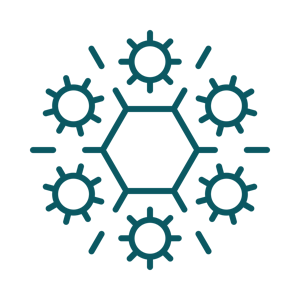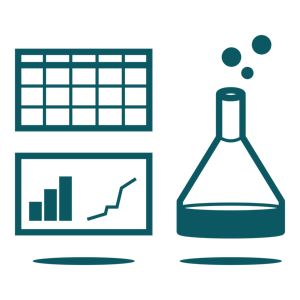While epidemiologists share many common tasks, there is a lot of variation among roles depending on the subject matter, geographic scope, and professional industry they are working in. Below you’ll find a more in-depth look at the responsibilities of epidemiologists working in various fields.
What does an epidemiologist working in Disaster and Outbreak Response do?
Some epidemiologists are involved in work that is in direct response to an emerging health threat. Some positions in this field include:
Field Epidemiologist: The work of these epidemiologists can often be distinguished by its pace and setting3. Field epidemiologists respond to urgent health threats, and often travel to affected sites in order to investigate and help resolve disease outbreaks and other public health problems. Field epidemiologists often conduct descriptive studies, which are done without changing the environment for informational purposes4, to better understand the issue before forming a hypothesis and conducting analytical studies. Tasks related to field epidemiology include:
Interviewing and Contact Tracing: During an active outbreak, epidemiologists contact people in the affected population to understand who has the disease, how they may have contracted it, and provide guidance for preventing spread.
Field Observation: Field epidemiologists are deployed during active outbreaks to meet with community members and collect biological samples to identify the health threat.
Disaster Epidemiologist: Disaster epidemiologists conduct field observations to understand the health impact resulting from a disaster and prevent future risk. Events studied include natural disasters, like fires, floods, and hurricanes, and man-made disasters, such as incidents of bioterrorism. Disaster epidemiologists monitor short and long term impacts in the affected areas and provide timely solutions to decision makers that support recovery and emergency response efforts5 .
Environmental Epidemiologist: Environmental exposures also pose a threat to human health. Epidemiologists in this field play a critical role assessing human exposure to biological, chemical, and physical stressors and the resulting diseases that occur from them6. Someone in this field may work for a national institute like the Environmental Protect Agency, or within a local or state health department. Tasks more specific to environmental epidemiologists include:
Chemical Testing: They may conduct ecological tests on features of the environment, such as soil and water, or biological tests on affected people, like blood level exposure tests. For example, an epidemiologist assessing environmental exposures to lead in a city may work with a team to collect samples of lead paint in homes, as well as with physicians to identify children with elevated blood lead levels (EBLLs).
Developing Environmental Advisories: An environmental epidemiologist can use information from contaminant and toxin evaluations to inform official environmental reports like local fish consumption advisories12.
What does an epidemiologist working with Communicable and Infectious Diseases do?
Other epidemiologists work specifically within the domain of communicable diseases. These roles include:
Infectious Disease Epidemiologist: These epidemiologists work to prevent future outbreaks. Case surveillance happens at the local and state level– there are about 120 notifiable diseases that health departments track and report to the CDC for nationwide surveillance7. Infectious disease epidemiologists can therefore work under many geographic scopes, including at the local, state, regional, federal, and global levels, in settings ranging from a local health department to the World Health Organization. In a research setting, they might also work to understand specific diseases through investigations funded by an academic or research institution.
Veterinary Epidemiologist: An estimated 6 out of 10 human infectious diseases can be spread from animals8. This field requires an extensive knowledge of animal health and is typically pursued by veterinarians. After pursuing a Doctor of Veterinary Medicine (DVM), a veterinarian may also pursue a Master of Public Health in epidemiology in order to strengthen their understanding of public health research methods.
Infection Control Epidemiologist: Infection control is a crucial part of keeping hospital patients, staff, and visitors safe. Also referred to as hospital epidemiologists, these epidemiologists typically have clinical degree, such as a medical (MD or DO) or nursing (RN or DNP) degree. They lead infection prevention efforts in hospitals with tasks including9:
Surveillance: Infection control professionals must monitor cases of infectious disease with the health center and lead preventative action where needed
Health policy and protocol development: Hospitals have sanitation protocols for activities such as handwashing, masking, and tool cleaning that aim to reduce the chance of spreading infection. Hospital epidemiologists help develop and enforce these protocols.
Cost-Benefit Analyses: In the context of a hospital or medical center, epidemiologists must understand the costs associated with implemented measures and be able to present
What does an epidemiologist working with non-communicable diseases do?
Epidemiologists are not only limited to studying active outbreaks or infectious diseases. Other specialists within the field include:
Molecular Epidemiologist: There is a growing understanding that disease determinants also include genetic factors, which are often studied on the molecular level. These epidemiologists work at the interaction of genetics, biology, and epidemiology to understand how genes, molecules and pathways impact disease transmission, especially in chronic diseases10.
Cancer Epidemiologist: Relatedly, the study of cancer deals with understanding the different risk factors related to cancer, including genetic risk and environmental exposure.
Pharmaceutical Epidemiologist: Pharmaceutical companies are also potential workplaces for epidemiologists, as they play an important role in clinical trials and may be involved in several parts of treatment development. In early phases of development, epidemiological research can be used to understand the impact of health issues and potential treatments in a population of interest. Epidemiologists can also help develop drug and medical device efficacy trials.
As you can see, there are many fields and subspecialities within epidemiology. Check out the video links below to see a ‘day-in-the-life’ of two epidemiologists working in different fields:




